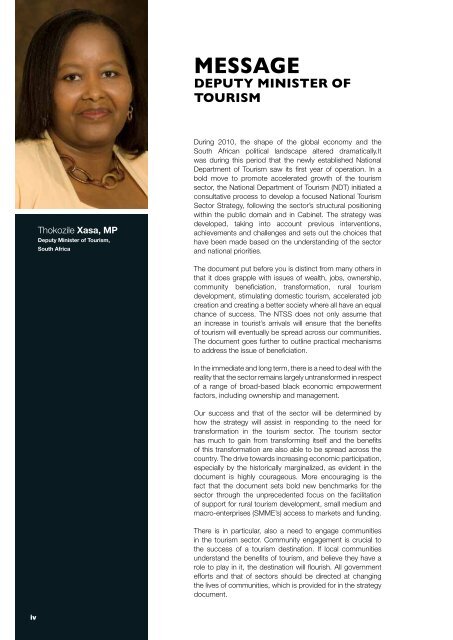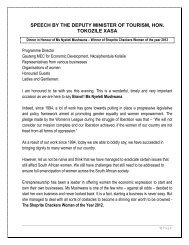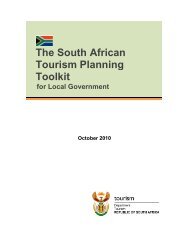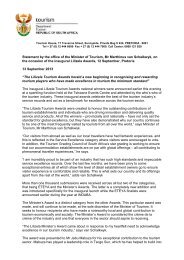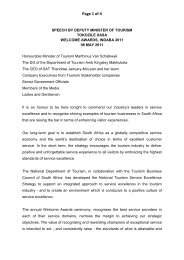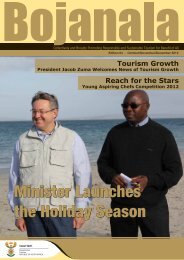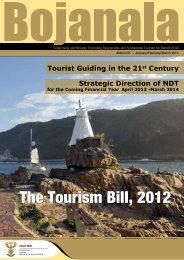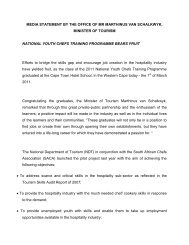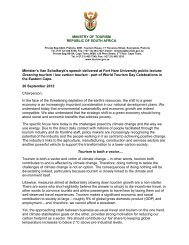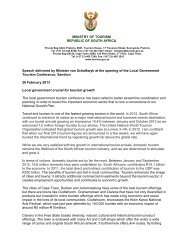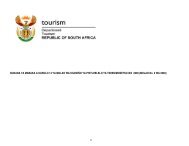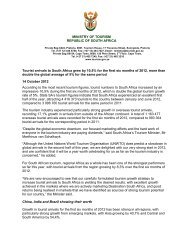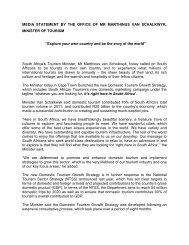National Tourism Sector Strategy - Department of Tourism
National Tourism Sector Strategy - Department of Tourism
National Tourism Sector Strategy - Department of Tourism
- No tags were found...
You also want an ePaper? Increase the reach of your titles
YUMPU automatically turns print PDFs into web optimized ePapers that Google loves.
messagedeputy MINISTER OFTOURISMThokozile Xasa, MPDeputy Minister <strong>of</strong> <strong>Tourism</strong>,South AfricaDuring 2010, the shape <strong>of</strong> the global economy and theSouth African political landscape altered dramatically.Itwas during this period that the newly established <strong>National</strong><strong>Department</strong> <strong>of</strong> <strong>Tourism</strong> saw its first year <strong>of</strong> operation. In abold move to promote accelerated growth <strong>of</strong> the tourismsector, the <strong>National</strong> <strong>Department</strong> <strong>of</strong> <strong>Tourism</strong> (NDT) initiated aconsultative process to develop a focused <strong>National</strong> <strong>Tourism</strong><strong>Sector</strong> <strong>Strategy</strong>, following the sector’s structural positioningwithin the public domain and in Cabinet. The strategy wasdeveloped, taking into account previous interventions,achievements and challenges and sets out the choices thathave been made based on the understanding <strong>of</strong> the sectorand national priorities.The document put before you is distinct from many others inthat it does grapple with issues <strong>of</strong> wealth, jobs, ownership,community beneficiation, transformation, rural tourismdevelopment, stimulating domestic tourism, accelerated jobcreation and creating a better society where all have an equalchance <strong>of</strong> success. The NTSS does not only assume thatan increase in tourist’s arrivals will ensure that the benefits<strong>of</strong> tourism will eventually be spread across our communities.The document goes further to outline practical mechanismsto address the issue <strong>of</strong> beneficiation.In the immediate and long term, there is a need to deal with thereality that the sector remains largely untransformed in respect<strong>of</strong> a range <strong>of</strong> broad-based black economic empowermentfactors, including ownership and management.Our success and that <strong>of</strong> the sector will be determined byhow the strategy will assist in responding to the need fortransformation in the tourism sector. The tourism sectorhas much to gain from transforming itself and the benefits<strong>of</strong> this transformation are also able to be spread across thecountry. The drive towards increasing economic participation,especially by the historically marginalized, as evident in thedocument is highly courageous. More encouraging is thefact that the document sets bold new benchmarks for thesector through the unprecedented focus on the facilitation<strong>of</strong> support for rural tourism development, small medium andmacro-enterprises (SMME’s) access to markets and funding.There is in particular, also a need to engage communitiesin the tourism sector. Community engagement is crucial tothe success <strong>of</strong> a tourism destination. If local communitiesunderstand the benefits <strong>of</strong> tourism, and believe they have arole to play in it, the destination will flourish. All governmentefforts and that <strong>of</strong> sectors should be directed at changingthe lives <strong>of</strong> communities, which is provided for in the strategydocument.iv


